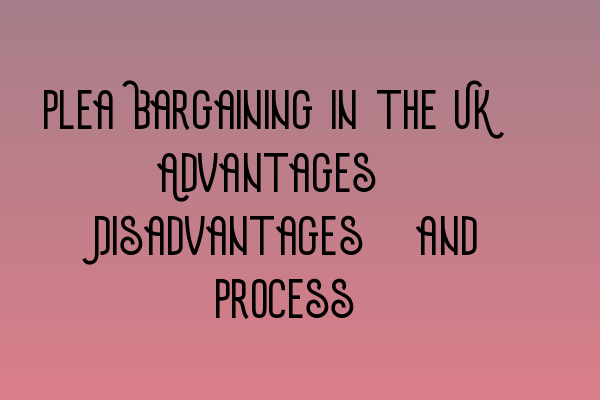Plea Bargaining in the UK: Advantages, Disadvantages, and Process
When it comes to criminal law cases in the UK, one important aspect to consider is plea bargaining. Plea bargaining is a negotiation process between the prosecution and the defense, where the defendant agrees to plead guilty in exchange for certain concessions or benefits.
Advantages of Plea Bargaining
Plea bargaining offers several advantages for both the defendant and the criminal justice system as a whole. One of the main advantages is that it can help save time and resources. By reaching a plea deal, the case can be resolved quickly, preventing the need for a prolonged trial that could be costly for both parties involved.
Furthermore, the defendant may benefit from a lighter sentence or a reduction in charges. This can be particularly advantageous if the evidence against the defendant is strong and the likelihood of a conviction is high. By accepting a plea deal, the defendant may avoid the risk of a harsher sentence if found guilty at trial.
Another advantage of plea bargaining is that it can help victims and their families by providing closure. Trials can be emotionally taxing, and by reaching a plea agreement, victims can avoid reliving traumatic events and move on with their lives.
Disadvantages of Plea Bargaining
While plea bargaining has its advantages, it is important to consider the disadvantages as well. One major concern is the potential for innocent individuals to plead guilty. In some cases, defendants may be pressured into accepting a plea deal, even if they are innocent, due to the fear of a lengthy trial or a potentially harsher sentence if found guilty.
Additionally, plea bargaining can raise concerns about the fairness and integrity of the criminal justice system. Critics argue that it can lead to disparities in sentencing, as individuals with similar charges may receive different outcomes based on their ability to negotiate a plea deal.
Furthermore, there is a risk of the public perceiving plea bargaining as a way for offenders to evade justice. Some may argue that by allowing defendants to plead guilty to lesser charges, it undermines the principle of accountability.
The Process of Plea Bargaining
The process of plea bargaining typically involves several steps. First, the defendant and their legal representation will engage in discussions with the prosecution to explore the possibility of a plea deal. This includes reviewing the evidence, assessing the strength of the case, and considering potential sentencing options.
If both parties agree to pursue a plea deal, they will negotiate the terms and conditions. This may involve reducing charges, recommending a specific sentence, or agreeing to dismiss certain charges altogether.
Once an agreement is reached, the plea deal will be presented to the court for approval. The judge will then review the terms to ensure fairness and reasonableness. If approved, the defendant will enter a plea of guilty in court, and the agreed-upon sentence or conditions will be imposed.
Overall, plea bargaining plays a significant role in the UK criminal justice system. It offers advantages such as saving time and resources, providing benefits for defendants, and offering closure for victims. However, it is essential to be aware of the potential disadvantages, including the risk of innocent individuals pleading guilty and concerns about fairness and public perception.
If you are facing criminal charges or require legal representation for a related matter, our team at SQE Criminal Law & Practice Law UK is here to assist you. Contact us today to schedule a consultation.
Related Articles:
- Legal Representation for Delaware LLCs in the UK: Expert Advice
- Ensuring Ethical Business Practices: Delaware’s Code of Conduct
- Legal Challenges for UK Businesses in the U.S.: Strategies for Overcoming Hurdles
- Legal Challenges for UK Businesses in the U.S.: Strategies for Overcoming Hurdles
- SQE Exam Prep: Essential Study Materials for Aspiring Solicitors
